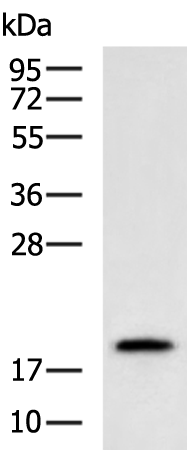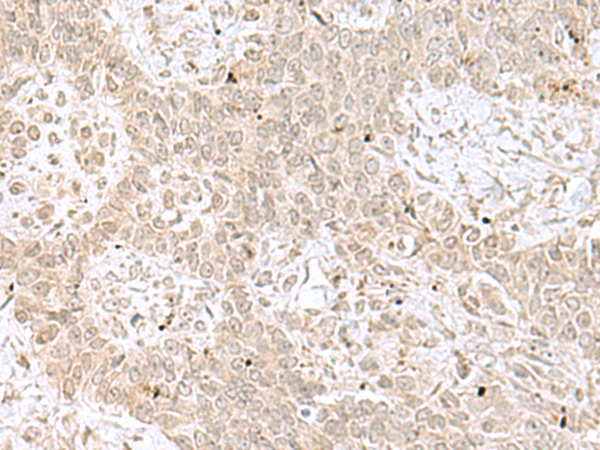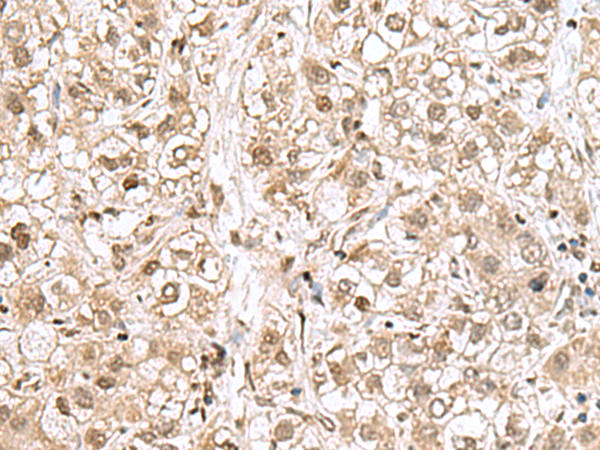


| WB | 咨询技术 | Human,Mouse,Rat |
| IF | 咨询技术 | Human,Mouse,Rat |
| IHC | 咨询技术 | Human,Mouse,Rat |
| ICC | 技术咨询 | Human,Mouse,Rat |
| FCM | 咨询技术 | Human,Mouse,Rat |
| Elisa | 咨询技术 | Human,Mouse,Rat |
| Aliases | L35 |
| WB Predicted band size | 15 kDa |
| Host/Isotype | Rabbit IgG |
| Antibody Type | Primary antibody |
| Storage | Store at 4°C short term. Aliquot and store at -20°C long term. Avoid freeze/thaw cycles. |
| Species Reactivity | Human, Mouse, Rat |
| Immunogen | Fusion protein of human RPL35 |
| Formulation | Purified antibody in PBS with 0.05% sodium azide and 50% glycerol. |
+ +
以下是关于EGFL6抗体的3篇参考文献示例(注:部分文献信息为示例性概括,具体研究请参考实际数据库):
1. **文献名称**:*"EGFL6 regulates the asymmetric division, maintenance, and metastasis of ALDH+ ovarian cancer cells"*
**作者**:Luo J, et al.
**摘要**:研究揭示了EGFL6在卵巢癌ALDH+肿瘤干细胞中的高表达,并通过单克隆抗体靶向EGFL6抑制其不对称分裂和转移,提示EGFL6抗体在治疗中的潜在作用。
2. **文献名称**:*"A monoclonal antibody targeting EGFL6 exhibits anti-angiogenic and anti-tumor activity in preclinical models"*
**作者**:Wang Y, et al.
**摘要**:开发了一种靶向EGFL6的单克隆抗体,实验显示其能显著抑制肿瘤血管生成,并在小鼠异种移植模型中减少卵巢癌和乳腺癌的肿瘤生长。
3. **文献名称**:*"EGFL6 promotes breast cancer metastasis by inducing EMT and modulating the tumor microenvironment"*
**作者**:Chen X, et al.
**摘要**:研究发现EGFL6通过诱导上皮-间质转化(EMT)促进乳腺癌转移,使用中和抗体阻断EGFL6可逆转EMT过程并抑制肿瘤微环境中的促转移信号。
如需具体文献,建议通过PubMed或Google Scholar以关键词“EGFL6 antibody”“anti-EGFL6 therapy”检索最新研究。
EGFL6 (Epidermal Growth Factor-like domain-containing protein 6) is a secreted extracellular matrix protein belonging to the EGF superfamily. It is characterized by multiple EGF-like domains and a conserved C-terminal EMI domain, which mediate interactions with integrins or other cell-surface receptors. EGFL6 is primarily expressed during embryonic development and plays roles in angiogenesis, tissue remodeling, and cell migration. In adults, its expression is low under normal physiological conditions but is upregulated in certain cancers, including ovarian, breast, and hepatocellular carcinomas, where it promotes tumor progression, metastasis, and neovascularization by modulating endothelial cell activity and extracellular matrix dynamics.
Antibodies targeting EGFL6 have emerged as valuable tools for both research and therapeutic exploration. In research, they are used to detect EGFL6 expression in tissues or biological fluids, aiding in studies of its functional mechanisms and association with disease states. Therapeutically, EGFL6-blocking antibodies are being investigated for their potential to inhibit tumor growth and angiogenesis by disrupting EGFL6-receptor interactions (e.g., with αvβ3 integrin or Notch pathways). Some preclinical studies suggest that anti-EGFL6 antibodies may enhance the efficacy of chemotherapy or anti-angiogenic agents. However, clinical applications remain exploratory, with ongoing efforts to optimize specificity and evaluate safety. Overall, EGFL6 antibodies represent a promising avenue for understanding cancer biology and developing targeted therapies.
×